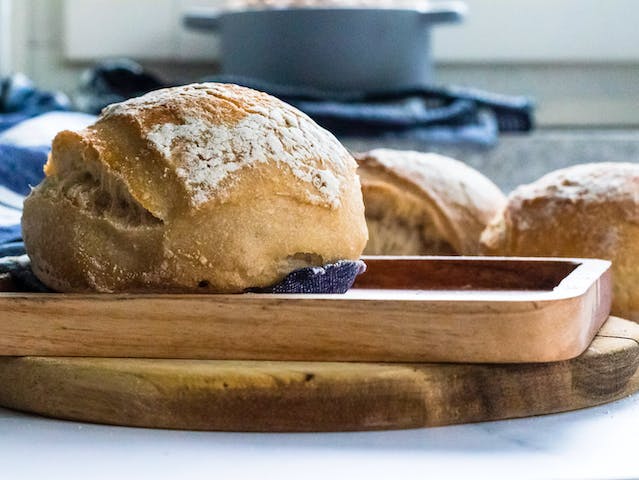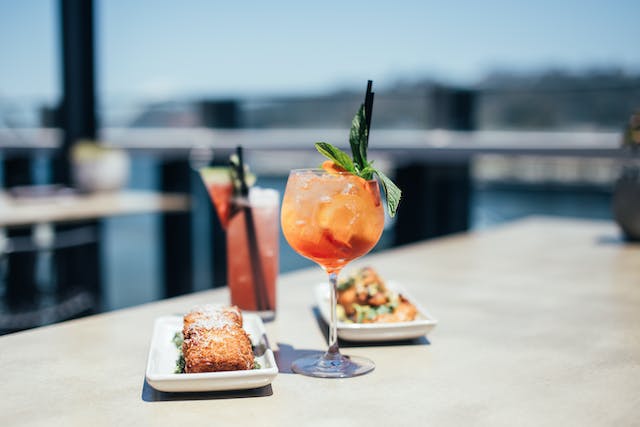7 French Eating Habits Explained by a Parisian
Delving into a culture's culinary landscape is akin to opening a treasure chest of traditions and customs. French cuisine, celebrated globally, is not just about the dishes but the unique eating customs that define the experience. To unravel the secrets behind French food habits, we turned to Eva, a passionate French teacher, as our guide.
In this blog, she'll share some of France's most distinctive eating customs so you can savour your next French meal like a local.
Table of Contents
- 1. Bread: An Integral Part of French Meals
- 2. Meat: A Marked Preference for 'Rare' Tastes
- 3. Cheese: A French Favourite
- 4. Dessert: A Sweet Form of Indulgence
- 5. Apéritif: The Prelude to Gastronomic Bliss
- 6. Coffee: Breakfast Mugs and Post-Dinner Sips
- 7. Digestif: A Nightcap to Culminate the Evening
- Embrace French Food Habits with Listen & Learn
→Sign Up Now: Free Trial French Lesson With a Native Teacher!←
1. Bread: An Integral Part of French Meals
In France, breaking bread is not just a saying—it's a ritual. Eva shares, "The woven basket lined with cotton, the designated bread-cutter—it's all part of the experience." The French treat bread with reverence; it's not merely an accompaniment but a prelude to a gastronomic journey. At restaurants, the breadbasket is a staple. However, while indulgence is permitted, there's an art to moderation. "We don't eat the whole basket," Eva says, with a smile. "But we like knowing it's there."
So, while in France, relish your bread (it is truly delicious), but leave room for the main course.
2. Meat: A Marked Preference for 'Rare' Tastes
In French gastronomy, finding the right "cuisson" (cooking point) for meat is of paramount importance, especially when it's beef. The majority of restaurants will cook your steak to perfection if you ask for 'à point' (medium).
However, it's important to note that French people like their food on the rare side ('saignant'). They even eat it completely raw ('bleu') in the form of tartare. According to Eva, French people "are not afraid of catching anything bad" and they love rare flavours so much that old cured meats and pâtés are a big part of French eating habits, usually presented as starters before the main course.
3. Cheese: A French Favourite
In the grand performance of eating customs in France, cheese takes centre stage. The most popular cheese course includes a selection of fresh goat, sheep and cow's milk cheeses served alongside crunchy baguette slices. According to Eva, there are dozens of types of French cheeses, and the French take great pride in their cheese-making traditions. "Each region has unique varieties," she shares, "and we like to pair them with regional wines for a complete sensory experience."
Regarding French eating habits, cheese follows the main course but precedes dessert, always paired with a bit of bread—a custom ingrained in our culinary culture." As people engage in conversation, each slice becomes a ritual, illustrating the depth of eating customs in France, where meals are meant to be savoured and lingered over.”
4. Dessert: A Sweet Form of Indulgence
If you're one of those people who yearn for something sweet immediately after a meal, you'll be delighted with French food habits. According to Eva, the French have an uncanny ability to make 'indulgence' sound like 'necessity,' and they do it exceptionally well when it comes to desserts.
"Eating dessert in France is not just about satisfying your sweet tooth," Eva explains. "It's about the entire experience—the presentation, the accompanying wine." From classic pastries like croissants and macarons to complex desserts like crème brûlée and tarte Tatin, French desserts are a necessary delight and a testament to the country's culinary legacy.
5. Apéritif: The Prelude to Gastronomic Bliss
Before the main course, there's the apéritif—a social prelude to a feast." It's more than a starter and definitely much more than just drinks; it's almost a whole meal before the main meal.
For the apéritif, you can have olives, crisps, peanuts, or a glass of wine—the ritual varies from casual to elaborate, depending on the occasion. Regardless, one thing remains the same—the apéritif is an essential part of French eating customs.
6. Coffee: Breakfast Mugs and Post-Dinner Sips
How do the French drink their coffee? Eva is quick to respond: "As soon as we wake up, we pour coffee into a generous mug, and we add a large splash of milk. Then we dip our ‘tartine’, which is fresh bread with butter, jam or honey, brioche, or croissant."
But coffee is not reserved for breakfast. Just like apéritif is a pre-meal ritual, coffee in France is a post-meal tradition. "A small shot of black coffee is the norm, a finale to a great meal," says Eva. "It doesn't have to be a whole mug, though. After a meal, it's just espresso shots or 'café noisette' (espresso with a dash of milk), which is the perfect end to a hearty lunch or dinner."
7. Digestif: A Nightcap to Culminate the Evening
As the French say au revoir to a sumptuous meal, the ritual of the digestif takes centre stage. "It's a small drink to help you digest," Eva explains. Whether it's cognac, Armagnac, or a herbal liqueur like Chartreuse, the French cherish this last sip of indulgence as they bid adieu to the dining table.
Embrace French Food Habits with Listen & Learn
As we got to explore the nuances of French food habits guided by our dear Eva, it became evident to us that dining in France is a cultural journey filled with tradition and zest for life. From the artful presentation of food to the ritualistic approach to eating, French food habits are an experience that transcends taste. And, for those captivated by French cuisine, now there's an opportunity to go beyond the plate.
Learning French with a native speaker not only opens linguistic doors but also immerses you in a way of life.
→Sign Up Now: Free Trial French Lesson With a Native Teacher!←
Instead of just guiding you through a textbook, our native-speaking instructors provide personalised lessons that include cultural insights and practical language skills to help you navigate the French dining scene like a local. What’s more, our teachers combine learning materials such as coursebooks with authentic resources such as French films and music.
So, why not embark on a learning journey with Listen & Learn?
Whether you're looking for French lessons in London or in a smaller city, we have dedicated teachers ready to help you learn the language and immerse yourself in all aspects of the French language and culture!




